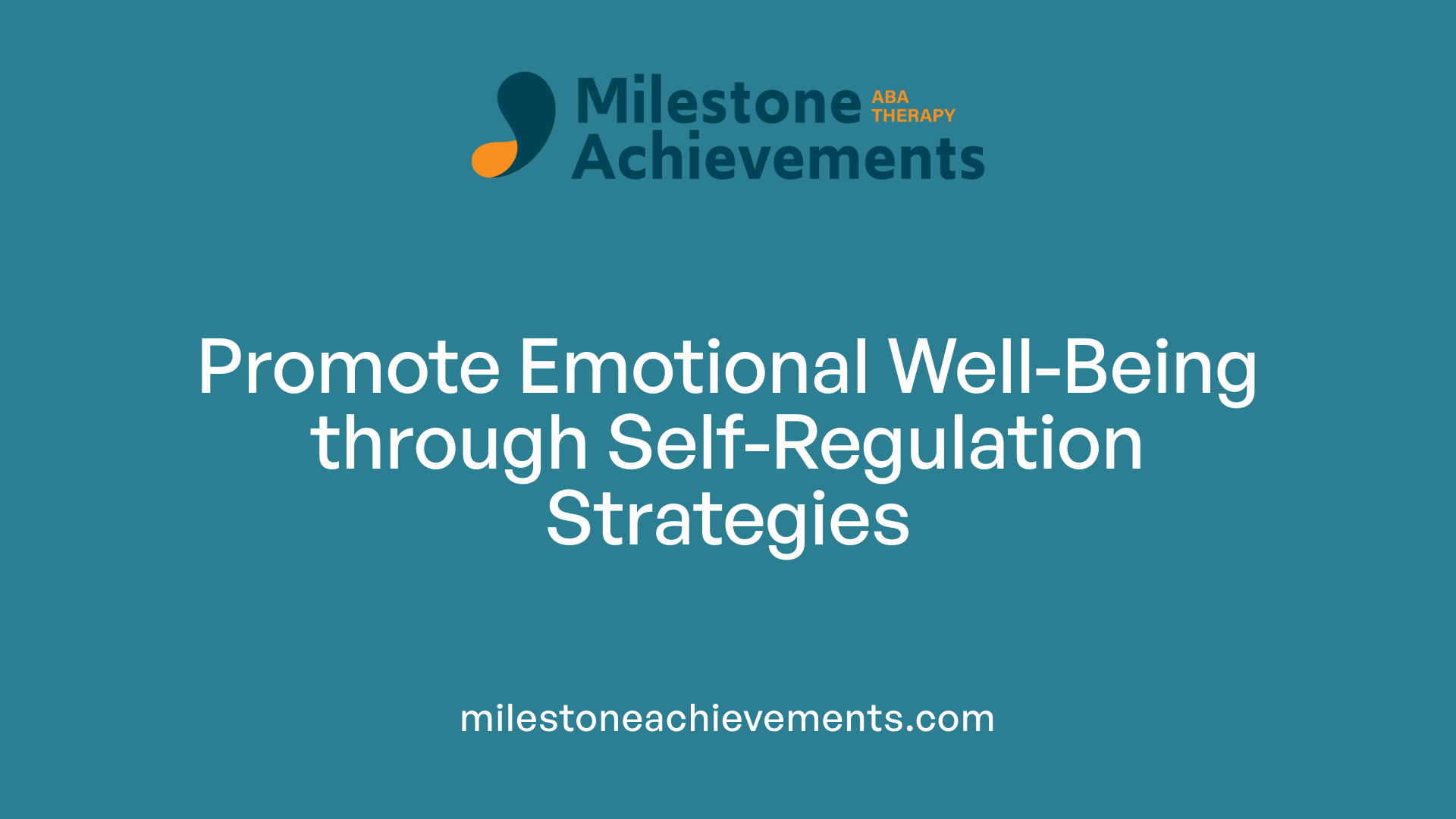
How ABA Therapy Helps Children Develop a Sense of Accomplishment
Transforming Lives Through ABA: Building Confidence and Independence in Children
Unlocking Potential: The Power of ABA Therapy in Child Development
Applied Behavior Analysis (ABA) therapy is a proven, evidence-based approach designed to support the growth and development of children, especially those with autism spectrum disorder. This comprehensive therapy system emphasizes skill acquisition, behavioral management, and fostering independence. By systematically breaking down complex skills and reinforcing positive behaviors, ABA therapy helps children develop a meaningful sense of achievement and confidence. This article explores how ABA therapy facilitates children's developmental progress across various domains, including communication, social skills, academic performance, and emotional regulation, ultimately empowering children to face daily challenges with confidence.
Enhancing Communication Skills to Foster Self-Expression

How can ABA principles be used to improve performance in various settings?
ABA, or Applied Behavior Analysis, utilizes a structured approach to improve performance across different environments by pinpointing behaviors that need growth and analyzing environmental influences. Practitioners gather detailed data to create personalized reinforcement plans that encourage positive behaviors and diminish undesirable ones. Skills are taught incrementally using techniques like task analysis and chaining, which break complex activities into manageable steps. This consistent reinforcement and targeted progress monitoring allow for adjustments, optimizing outcomes in educational, clinical, or everyday contexts. Such a systematic process ensures each setting aligns with the child's developmental needs.
What are the benefits of ABA therapy in fostering children's growth and skill development?
ABA therapy is a proven, evidence-based method that promotes a wide range of skills, including communication, social interactions, academic abilities, and daily independence. It helps reduce harmful behaviors by understanding their functions and teaching healthier alternatives. Customized programs using positive reinforcement promote meaningful learning and foster independence tailored to each child's needs. Studies show that long-term ABA interventions can significantly enhance language skills, social functioning, and overall well-being, ensuring children are better equipped to handle daily challenges.
How does ABA therapy support early childhood developmental progress?
In early childhood, ABA therapy accelerates developmental milestones by applying principles of effective learning and behavior management. It encourages acquisition and enhancement of essential skills such as talking, socializing, and self-care, all tailored uniquely to each child. Techniques like positive reinforcement increase beneficial behaviors while minimizing problematic ones, resulting in greater independence. Through detailed analysis of behaviors and environmental factors, ABA creates significant improvements in a child's daily life, supporting long-term growth and adaptation.
Does ABA help with academic performance?
Absolutely. ABA therapy enhances academic skills by implementing strategies that promote focus, task completion, and following instructions. These techniques help children become more engaged in learning environments, leading to better academic outcomes and increased confidence.
How does ABA therapy support children in developing a sense of accomplishment and confidence?
ABA fosters confidence by dividing complex skills into small, attainable steps and reinforcing each success. This approach encourages repeated practice, leading children to feel competent and motivated. Personalized goals and ongoing progress tracking help children see their growth, further strengthening their self-belief. As they master new skills, children develop resilience, independence, and a positive attitude toward learning.
What role does reinforcement play in building confidence in children?
Reinforcement is fundamental in building confidence because it rewards efforts and achievements. Positive reinforcement affirms a child's actions, making them more likely to repeat successful behaviors and gain a sense of mastery. Over time, this continuous encouragement deepens their belief in their abilities and increases motivation to learn and grow.
How does ABA promote independence in daily life activities?
ABA encourages independence by systematically teaching routines and self-care skills through structured lessons. As children learn and succeed at tasks like dressing, hygiene, and meal prep, prompts and support are gradually withdrawn. This process builds their confidence and capability, helping them become more autonomous in daily life.
In what ways does ABA therapy facilitate social integration and relationship building?
ABA enhances social skills by teaching children to interpret social cues, initiate conversations, share, and take turns. Guided practice and positive reinforcement help children develop strong communication skills and social confidence. These abilities enable children to build meaningful peer relationships and actively participate in social groups, fostering greater inclusion and peer acceptance.
| Aspect | Strategy | Benefit |
|---|---|---|
| Communication | Teaching signs, words, picture exchange systems | Better expression of needs and emotions |
| Social Skills | Role-playing, social stories, reinforcement | Increased peer interactions and relationships |
| Self-Care | Breaking tasks into steps, reinforcement | Greater independence and confidence |
| Behavior Management | Identifying triggers, positive reinforcement | Reduced problems like tantrums or aggression |
| Academic Skills | Task analysis, individualized plans | Improved focus, learning, and performance |
Overall, ABA therapy serves as a comprehensive approach to nurturing communication, social skills, independence, and emotional regulation, helping children with autism thrive across various aspects of life.
Building Self-Confidence Through Structured Learning and Reinforcement

How does ABA therapy support children in developing a sense of accomplishment and confidence?
ABA therapy plays a vital role in helping children with autism develop confidence by focusing on achievable goals. One of the fundamental strategies involves breaking down complex skills into small, manageable steps. This approach ensures that children experience success at every stage, which enhances their sense of mastery.
Reinforcement techniques are central to this process. Positive reinforcement, such as praise or rewards, encourages children to repeat helpful behaviors, fostering a sense of competence and encouraging continued effort. The therapy’s individualized design considers each child's needs and interests, making goals relevant and attainable.
Tracking progress meticulously allows therapists to celebrate even small advances, which boosts motivation and confidence. Adjustments based on data ensure that children are continuously challenged yet supported, promoting steady development. Overall, this environment of steady achievement and consistent support helps children build confidence, independence, and a positive outlook on their abilities.
What strategies are used to ensure children feel motivated and successful?
Motivation in ABA therapy is maintained through several purposeful strategies. Breaking tasks into small, digestible steps ensures that children are not overwhelmed, making each success tangible.
Immediate and consistent positive reinforcement plays a critical role. When children display desired behaviors, they receive praise or rewards, reinforcing that behavior. Personalizing goals to align with each child's interests keeps learning engaging and highly relevant.
Visual aids, such as charts or pictures, serve as reminders of progress and next steps, boosting motivation. Pairing these tools with encouragement and celebrating small successes helps children associate learning with positive emotions, fostering a motivated mindset.
How does tailoring goals to individual children enhance the effectiveness of ABA therapy?
Customizing goals to each child's unique profile makes ABA therapy more effective. When goals are based on a child's specific interests, strengths, and needs, they become more meaningful and engaging.
Personalized goals increase motivation because children are more likely to participate actively when tasks resonate with their preferences. This tailored approach also ensures that skills taught are relevant to their daily lives, promoting functional independence.
By considering individual differences, therapists can set realistic, achievable targets that encourage continuous progress. This personalization leads to higher success rates and helps parents and caregivers see significant developmental strides, reinforcing the child's confidence.
In what ways can data tracking improve outcomes and reinforce children’s progress?
Data tracking in ABA provides objective, measurable evidence of a child's development. Regular collection of data helps practitioners identify what strategies work best and where adjustments are needed.
Tracking progress allows for timely reinforcement of successful behaviors, which boosts confidence and motivation. It also uncovers patterns, such as triggers for challenging behaviors or areas requiring additional focus.
Furthermore, sharing data with families fosters transparency and involvement, making progress tangible to everyone involved. Over time, this systematic approach ensures that children experience consistent growth, feel more confident in their abilities, and are encouraged to undertake new challenges.
| Approach | Description | Benefits |
|---|---|---|
| Breaking skills into steps | Dividing complex skills into small, manageable parts | Increases success and builds confidence |
| Positive reinforcement | Using praise or rewards for desired behaviors | Encourages repetition and mastery |
| Personalizing goals | Tailoring targets to individual preferences | Enhances engagement and motivation |
| Data tracking | Collecting measurable progress data | Guides adjustments and demonstrates growth |
| Visual aids | Charts, pictures, or schedules | Clarify expectations and motivate children |
This structured, personalized approach helps children develop essential skills, ultimately leading to more self-reliant and confident individuals who are better equipped to face daily challenges.
Integrating Social and Play Skills to Promote Holistic Development

How can ABA principles be used to improve performance in various settings?
ABA (Applied Behavior Analysis) principles are versatile tools that can be applied across many environments, including home, school, and community settings. The process begins with identifying specific behaviors that need improvement and analyzing the factors in the environment that influence these behaviors. Practitioners systematically collect data to understand patterns and tailor interventions accordingly.
One effective approach involves developing individualized reinforcement strategies that reward desired behaviors, encouraging their recurrence. Skill acquisition methods such as task analysis and chaining break down complex skills into manageable steps, allowing children to learn gradually and confidently.
Consistency in applying reinforcement and strategies is crucial. ABA emphasizes setting realistic, measurable goals and continuously monitoring progress. This dynamic process ensures that interventions remain effective and adaptable, maximizing benefits for the child.
Ultimately, applying ABA principles creates a structured, evidence-based framework that enhances performance in classrooms, therapy sessions, social settings, and daily routines, fostering meaningful skill development.
What are the key components of ABA therapy that support social skill development?
Several core components of ABA therapy underpin successful social skill development. These include structured social skills training, which breaks social interactions into smaller, manageable steps. For example, children might learn how to initiate a conversation, maintain eye contact, or share toys through guided practice.
Reinforcement strengthens positive social behaviors, encouraging children to repeat them. Natural environment teaching allows children to practice social skills in real-world settings, making the learning more relevant and effective.
Guided practice sessions help children understand social cues and reciprocal interactions, building their confidence to converse and connect with peers. Techniques like role-playing and social scripts are often used within these components.
These strategies collectively support children in understanding others' emotions, sharing, taking turns, and interpreting social cues—skills that are foundational for meaningful peer relationships.
How does participation in play activities aid in a child's development?
Play is a vital area of development that ABA therapy actively encourages. Through structured play activities, children learn essential problem-solving skills, develop creativity, and improve their ability to interact socially.
By engaging with toys and participating in group activities, children practice sharing, negotiating, and collaborating, which are important social skills. Play also provides a natural setting for children to practice emotional regulation—learning to manage frustration or excitement appropriately.
Incorporating play in therapy makes learning enjoyable and meaningful. It enables children to generalize skills learned during structured sessions to everyday situations, promoting holistic growth.
How does positive reinforcement influence a child's motivation to learn?
Positive reinforcement is a foundational element in ABA that directly impacts a child's motivation. When children receive rewards—such as praise, tokens, or preferred activities—for demonstrating desired behaviors, they are more likely to repeat those behaviors.
This reinforcement process builds confidence and creates a sense of accomplishment, making learning a rewarding experience. As children associate positive outcomes with their efforts, their intrinsic motivation to participate and learn increases.
By maintaining a motivating environment, positive reinforcement ensures sustained engagement and enthusiasm for acquiring new skills, supporting both short-term progress and long-term development.
In what ways does ABA therapy promote holistic development beyond specific skills?
ABA therapy adopts a comprehensive approach, addressing not only specific skills but also fostering emotional, social, and adaptive behaviors essential for overall well-being. By integrating various intervention strategies, ABA helps children improve communication, develop social competence, and manage emotions effectively.
This holistic focus supports independence in daily activities and academic success, as progress in one area often enhances growth in others. For example, improving self-regulation can lead to better social interactions, while academic achievements boost confidence.
The structured nature of ABA, combined with positive reinforcement and generalization opportunities, empowers children to become more autonomous, resilient, and capable of managing different challenges, leading to balanced development across multiple domains.
Fostering Emotional Self-Regulation and Well-being

How does ABA therapy support early childhood developmental progress?
ABA therapy addresses early childhood development by applying evidence-based learning principles that promote positive growth. It focuses on building fundamental skills such as communication, social interaction, self-care, and motor abilities, all tailored to each child's unique needs. Using techniques like positive reinforcement, ABA encourages helpful behaviors while reducing problematic actions, fostering independence and functional skills.
By analyzing behavior patterns and environmental influences, ABA creates customized interventions that make meaningful improvements in daily life. This structured approach helps children acquire essential skills, increasing their capacity to adapt and thrive. Overall, ABA supports early developmental progress, enhancing quality of life and long-term outcomes for young children on the autism spectrum.
How do coping strategies taught in ABA improve emotional regulation?
Coping strategies such as deep breathing, visual schedules, and calming techniques are instrumental in ABA therapy for developing emotional regulation. These methods help children become aware of emotional triggers and learn appropriate responses, reducing the likelihood of outbursts like tantrums or aggression.
Consistent practice of these strategies enables children to manage reactions like anger or frustration effectively. Over time, they develop resilience and better control over their emotions, which benefits their mental health and social interactions.
In what ways can emotional regulation influence a child's development?
Effective emotional regulation plays a crucial role in a child's overall development. Children who can manage their emotions tend to navigate social situations more successfully, perform better academically, and experience improved mental health.
When children control their frustrations and anxieties, they are more likely to build positive relationships, exhibit self-confidence, and approach problems calmly. These skills contribute to a child's resilience, problem-solving abilities, and long-term social and emotional well-being.
What role does parent training play in enhancing emotional regulation and overall progress?
Parent training is a vital component of ABA therapy that significantly supports a child's emotional regulation and overall growth. It equips caregivers with practical strategies to reinforce calming techniques, manage behavioral challenges, and respond empathetically to emotional needs.
Trained parents can consistently apply learned strategies at home, creating a stable environment that fosters ongoing development. This shared effort ensures that emotional regulation skills are reinforced across different settings, leading to more consistent progress and stronger family bonds.
How does ABA therapy help children develop self-care skills that promote independence?
ABA therapy systematically teaches self-care routines such as dressing, hygiene, and daily tasks through structured lessons and positive reinforcement. Tasks are broken down into small, manageable steps, making them less overwhelming and easier to master.
By gradually reducing prompts and support, children gain confidence in performing these activities independently. Developing strong self-care skills not only boosts their self-esteem but also encourages autonomy, helping them participate fully in daily life and social environments.
| Aspect | Approach | Benefit | Example |
|---|---|---|---|
| Communication skills | Teaching verbal and non-verbal methods like sign language and picture exchange | Enables expressing needs and feelings effectively | Using picture cards to request a snack |
| Social skills | Breaking down interactions into skills such as sharing or taking turns | Improves peer relationships and confidence | Reinforcing eye contact during play |
| Managing behaviors | Identifying triggers and reinforcing positive behaviors | Reduces challenging behaviors like aggression | Teaching calming techniques to replace tantrums |
| Self-care routines | Teaching routines through steps and positive reinforcement | Promotes independence and self-esteem | Completing dressing tasks independently |
| Emotional regulation | Teaching coping and calming strategies | Enhances mental health and resilience | Deep breathing exercises for anxiety |
Overall, ABA therapy offers a comprehensive framework that supports children in developing emotional, social, and practical skills. By integrating structured teaching, reinforcement, and family involvement, ABA helps children face daily challenges with confidence and independence.
Empowering Children for a Confident Future
ABA therapy is a powerful tool that promotes comprehensive development and cultivates a strong sense of accomplishment in children. By supporting skill acquisition across communication, social interaction, self-care, academic achievement, and emotional regulation, ABA helps children build confidence and independence. Its structured, individualized approach ensures that children not only learn necessary skills but also develop the self-efficacy to face life's challenges, laying the foundation for a brighter, more autonomous future.
References
- 7 Surprising Benefits of ABA Therapy for Kids You Need to Know
- How ABA Therapy Helps Children Develop Essential Life Skills
- The Benefits of ABA Therapy in Early Childhood Development
- How ABA Therapy Helps Children with Behavioral Challenges
- How ABA Therapy Builds Confidence in Children with Autism
- Applied Behavior Analysis (ABA) | Autism Speaks
- Applied Behavioral Analysis (ABA) - Autism Speaks
- ABA and other therapies | Autism Speaks
- Can ABA help a teen on the mildly affected end of the autism ...
- Expert Q&A: How ABA therapy can help with severe behaviors


Partner with us on your child's journey
Milestone Achievements offers evidence-based ABA therapy to help children with autism reach their full potential. Together we’ll set meaningful goals and celebrate progress every step of the way.
Start ABA Services Today


